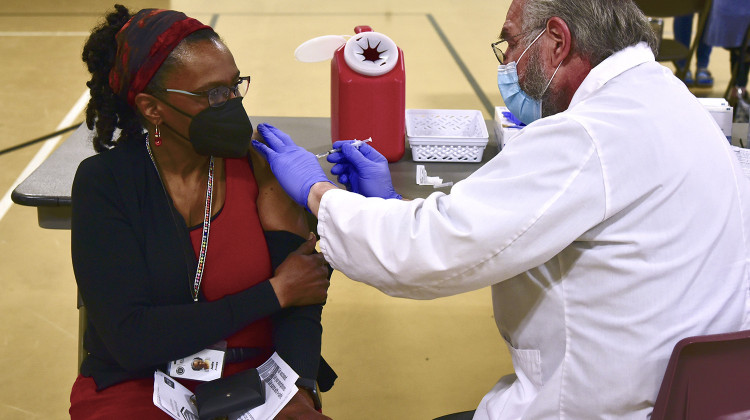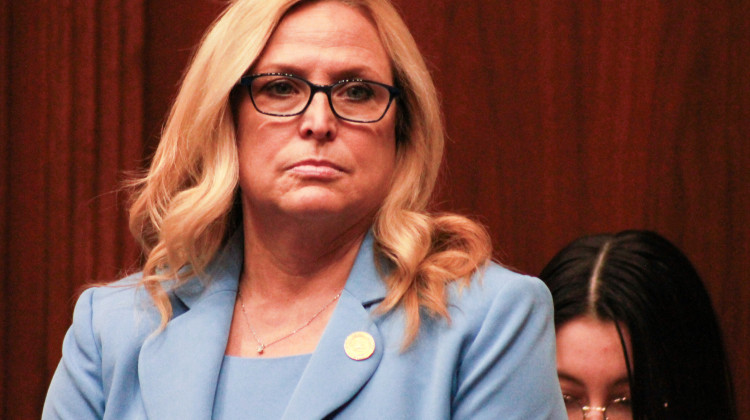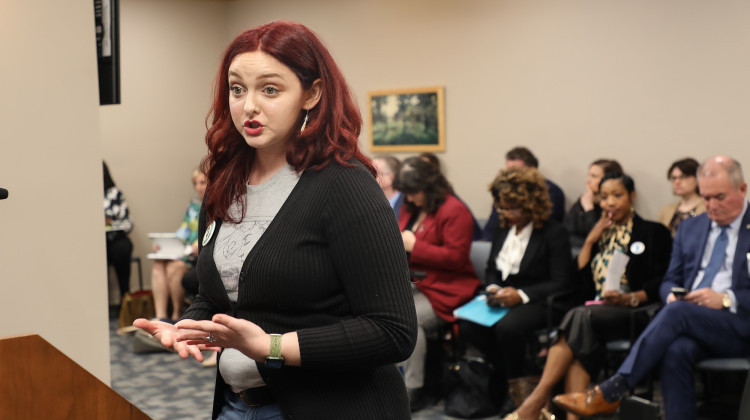
Indiana added 11,399 new cases in the last seven days – continuing its downward slide to early August numbers.
Lauren Chapman/IPB NewsIndiana surpasses 1 million confirmed COVID-19 cases. Health officials grow concerned that hesitancy will play into other vaccines like the flu. And the state begins its rollout of booster shots.
THE DATA
Indiana added 11,399 new cases in the last seven days – continuing its downward slide to early August numbers.
It did, however, surpass 1 million confirmed COVID-19 cases on Monday, Oct. 18. The milestone coincides with the state reporting its fewest number of new cases since Aug. 1 – IDOH reported 701 new cases Monday.
Hospitalizations have also improved significantly: The state’s hospital census reached its delta peak at 2,676 on Sept. 10. The most recent census has dropped to 1,445 – the fewest since Aug. 13.
Deaths are also still dropping. The state added 217 deaths to its total in the last week, and is averaging about 27 deaths per day – down from September’s average of 39.
FLU, BOOSTERS AND COVID-19
To help hospitals, Hoosiers urged to get vaccines after first flu-related death of season
Health experts are encouraging Hoosiers to get their flu vaccination after Indiana recorded the first flu related death of the season on Friday.
Indiana University Fairbanks School of Public Health’s Shandy Dearth said it is important for people to get flu shots to protect themselves and the state’s hospitals — which continue to be hit hard with COVID-19 cases.
“We've already, you know, surged the hospitals enough with COVID,” Dearth said. “You add flu on top of that, and that could be a very bad situation.”
State health officials fear COVID-19 vaccine hesitancy will affect flu vaccine uptake
State health officials say they’re worried fewer people will get vaccinated against the flu this year.
Indiana recently recorded its first flu death of the season. And the state has offered the flu vaccine at some of its COVID-19 vaccination sites, since the two can be taken together.
State Health Commissioner Dr. Kris Box said she’s concerned about the larger implications of COVID vaccine hesitancy.
“That … the political nature that has, you know, surrounded that will then bleed off into other childhood vaccines and influenza vaccines that people tend to get on a yearly basis,” Box said.
Eligible Hoosiers can now receive boosters of Moderna, Johnson & Johnson vaccines
The Indiana Department of Health announced Friday it will offer booster shots of the Moderna and Johnson & Johnson vaccines to eligible Hoosiers. This follows Thursday’s federal authorization. Pfizer booster shots have been available since last month.
The U.S. Centers for Disease Control and Prevention authorized booster shots for recipients of the Pfizer and Moderna vaccines if it has been six months since their first dose and they are either 65 years or older, 18 and older and live in long-term care settings, 18 and older with underlying medical conditions, or 18 and older and work or live in high-risk settings.
READ MORE: How Is Indiana Distributing COVID-19 Vaccines? Here's What You Need To Know
Join the conversation and sign up for the Indiana Two-Way. Text "Indiana" to 73224. Your comments and questions in response to our weekly text help us find the answers you need on COVID-19 and other statewide issues.
Health experts cautiously optimistic for a better pandemic winter after last year's surge
Last winter saw a surge in COVID-19 cases, hospitalizations and deaths. Health experts say there is reason to be hopeful this second pandemic winter will be different.
Dr. Cole Beeler, IU Health infectious disease physician, said the landscape of the pandemic has changed.
“I think we're in a completely different world as it relates to how COVID is spreading in the population and who it's targeting,” Beeler said.
He said last winter there was no vaccine available and less of the population had been infected, which meant more people were vulnerable to coronavirus.
THE HEADLINES
Holcomb appeals in emergency powers lawsuit against fellow Republicans
Gov. Eric Holcomb is appealing a judge’s ruling in his emergency powers lawsuit against the General Assembly.
Legislators passed a law this year, HEA 1123, that gives them the power to call themselves into special session during a public emergency – like the pandemic. Holcomb believes the Indiana Constitution gives that power solely to the governor.
But a Marion County judge sided with lawmakers earlier this month. He said legislators generally get to determine when and for how long they meet – making the new emergency powers law constitutional.
September unemployment improves, but still a lot of open jobs and not enough workers
Indiana’s unemployment rate for September was 4 percent, dropping very slightly from the month before. Meanwhile, the head of the Indiana Department of Workforce Development estimated at a cabinet meeting Thursday there are still nearly 140,000 unfilled jobs.
Bureau of Labor Statistics data shows the raw number of people with jobs went up last month as unemployment went down. However, the total labor force – employed and unemployed combined – is continuing a months-long downward trend, meaning less people are looking for work for various reasons.
Kosali Simon is an economist at the O’Neil School at Indiana University. She said a large part of the reason the labor force shrunk could be from older workers retiring early to avoid getting sick from COVID-19.
“In March 2020, the job market did not realize that this was an age-based risk,” she said. “But now, it’s quite clear: The health risks are so age based.”
Indiana opens applications for second round of state learning recovery funds
Indiana is once again accepting grant applications from community groups and schools, targeted at catch-up programs for students who fell behind academically because of COVID-19.
State lawmakers approved $150 million for the Student Learning Recovery Grant Program earlier this year, with the goal to fund out-of-school programs helping students make up for lost learning time during the pandemic – the 2021-22 school year is the third one disrupted by COVID-19.
The state distributed more than $122 million for the first round of recipients this summer. Groups received grant money to provide services like new after-school tutoring, and expand existing programs aimed at improving students' reading and math skills.
Indianapolis Zoo's African lions test positive for delta variant of COVID-19
Three African lions at the Indianapolis Zoo are recovering after testing positive for the delta variant of COVID-19 last week.
The zoo said the lions were tested when the two females, Zuri and Sukari, presented with respiratory and digestive symptoms. The male, Enzi, has been asymptomatic. The lions were taken off exhibit and started on treatment immediately. According to the zoo, the two young lions are doing well. The older female, Zuri, is being treated for respiratory symptoms.
It is unclear as to how the lions caught the virus. The zoo said all staff are vaccinated and no staff working in proximity to the cats were sick or showed signs of the virus. It said staff working directly with the lions follow detailed safety protocols including wearing masks, gloves and following strict hygiene practices. COVID-19 tests for those staff members were all negative.
Contact Lauren at lchapman@wfyi.org or follow her on Twitter at @laurenechapman_.
 DONATE
DONATE






 Support WFYI. We can't do it without you.
Support WFYI. We can't do it without you.